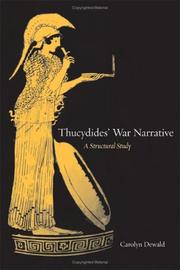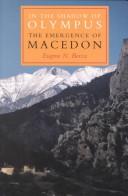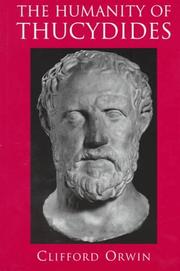| Listing 1 - 3 of 3 |
Sort by
|

ISBN: 9786612357473 1282357476 0520930975 159875940X 9780520930971 1423745442 9781423745440 9781282357471 9780520241275 0520241274 Year: 2005 Publisher: Berkeley, Calif. University of California Press
Abstract | Keywords | Export | Availability | Bookmark
 Loading...
Loading...Choose an application
- Reference Manager
- EndNote
- RefWorks (Direct export to RefWorks)
As a sustained analysis of the connections between narrative structure and meaning in the History of the Peloponnesian War, Carolyn Dewald's study revolves around a curious aspect of Thucydides' work: the first ten years of the war's history are formed on principles quite different from those shaping the years that follow. Although aspects of this change in style have been recognized in previous scholarship, Dewald has rigorously analyzed how its various elements are structured, used, and related to each other. Her study argues that these changes in style and organization reflect how Thucydides' own understanding of the war changed over time. Throughout, however, the History's narrative structure bears witness to Thucydides' dialogic efforts to depict the complexities of rational choice and behavior on the part of the war's combatants, as well as his own authorial interest in accuracy of representation. In her introduction and conclusion, Dewald explores some ways in which details of style and narrative structure are central to the larger theoretical issue of history's ability to meaningfully represent the past. She also surveys changes in historiography in the past quarter-century and considers how Thucydidean scholarship has reflected and responded to larger cultural trends.
HISTORY / Ancient / General. --- Thucydides. --- Greece --- History --- Historiography. --- Thucydides. -- History of the Peloponnesian War.. --- Greece -- History -- Peloponnesian War, 431-404 B.C.. --- Greece -- History -- Peloponnesian War, 431-404 B.C. -- Historiography. --- aegean war. --- alcibiades. --- ancient greece. --- archidamian. --- argos. --- athens. --- brasidas. --- chios. --- classical history. --- classical studies. --- community. --- delos. --- diplomacy. --- heroes. --- historiography. --- history. --- interregnum. --- ionia. --- lacedaemonians. --- locrian. --- melos. --- military history. --- military. --- narrative structure. --- narrative technique. --- narrative theory. --- narrative. --- nonfiction. --- peace. --- peloponnesian war. --- sicily. --- thucydides. --- unit of action. --- war. --- warriors.

ISBN: 0691055491 0691215944 9780691055497 0691008809 Year: 1990 Publisher: Princeton : Princeton University Press,
Abstract | Keywords | Export | Availability | Bookmark
 Loading...
Loading...Choose an application
- Reference Manager
- EndNote
- RefWorks (Direct export to RefWorks)
In tracing the emergence of the Macedonian kingdom from its origins as a Balkan backwater to a major European and Asian power, Eugene Borza offers to specialists and lay readers alike a revealing account of a relatively unexplored segment of ancient history. He draws from recent archaeological discoveries and an enhanced understanding of historical geography to form a narrative that provides a material-culture setting for political events. Examining the dynamics of Macedonian relations with the Greek city-states, he suggests that the Macedonians, although they gradually incorporated aspects of Greek culture into their own society, maintained a distinct ethnicity as a Balkan people. "Borza has taken the trouble to know Macedonia: the land, its prehistory, its position in the Balkans, and its turbulent modern history. All contribute ... to our understanding of the emergence of Macedon ... Borza has employed two of the historian's most valuable tools, autopsy and common sense, to produce a well-balanced introduction to the state that altered the course of Greek and Near Eastern history.
Macedonia --- -Macedon --- History --- -Macedonia --- -History --- Makedhonia --- Makedonia --- Makedoniya --- Makedonja --- Macedon --- -Oudheid. --- Macedoniërs. --- Makedonien (Altertum) --- Europe --- Council of Europe countries --- Eastern Hemisphere --- Eurasia --- Oudheid. --- Aegae. --- Aeschines. --- Alexander I. --- Archelaus. --- Axios R. --- Boeotia. --- Brasidas. --- Caranus. --- Cassander. --- Cersebleptes. --- Diodorus Siculus. --- Epaminondas. --- Eumenes of Cardia. --- Florina. --- Gygaea. --- Hellenistic period. --- Heracles. --- Hesiod. --- Isocrates. --- Kotys (Cotys). --- Lefkadia. --- Makedones. --- Mardonius. --- Naousa. --- Olympia. --- Peloponnesian War. --- Persians. --- Salonica. --- Sitalces. --- Themistocles. --- Thermaic Gulf. --- Thrace. --- Vergina. --- Via Egnatia. --- World War II. --- Xerxes. --- Zeus. --- gold resources. --- inscriptions. --- minerals and mines. --- painting. --- -Makedonien (Altertum) --- Macedoine --- Histoire ancienne --- -Macedoine

ISBN: 0691034494 0691219400 9780691034492 0691017263 Year: 1994 Publisher: Princeton (N.J.): Princeton university press
Abstract | Keywords | Export | Availability | Bookmark
 Loading...
Loading...Choose an application
- Reference Manager
- EndNote
- RefWorks (Direct export to RefWorks)
Thucydides has long been celebrated for the unflinching realism of his presentation of political life. And yet, as some scholars have asserted, his work also displays a profound humanity. In the first thorough exploration of the relation between these two traits, Clifford Orwin argues that Thucydides' humanity is not a reflection of the author's temperament but an aspect of his thought, above all of his articulation of the central problem of political life, the tension between right and compulsion. This book provides the most complete treatment to date of Thucydides' handling of the problem of injustice, as well as the most extensive interpretations yet of the speeches in which it comes to light. Thucydides does not merely display the weakness of justice in the world, but joins his characters in exploring the implications of this weakness for our understanding of what justice is. Orwin pursues this question through Thucydides' work and relates it to the historian's other leading concerns, such as the contrast between the Athenian way and the Spartan way, the role of piety in political life, the interaction of foreign and domestic politics, and the role of statesmanship in a world dominated by frenzies of hope, fear, and indignation. Above all, Orwin demonstrates the richness, complexity, and daring of Thucydides' articulation of these issues.
Human behavior --- Thucydides --- Greece --- History --- Historiography --- Action, Human --- Behavior, Human --- Ethology --- Human action --- Human beings --- Human biology --- Physical anthropology --- Psychology --- Social sciences --- Psychology, Comparative --- Behavior --- Fukidid --- Tucídides --- Thukydides --- Thoukydidēs --- Tucidide --- תוקידידיס --- Θουκυδίδης --- -Human behavior --- Thucydide --- Thoukudides --- Thucydides. --- Historiography. --- Human behavior. --- Aeolians. --- Alcibiades. --- Attica. --- Boeotia, Boeotians. --- Brasidas. --- Cleon. --- Cogan, Marc. --- Corinth, Corinthians. --- Delphic Oracle. --- Diodotus. --- Dorian Greeks. --- Edmunds, Lowell. --- Epidamnus. --- Farrar, Cynthia. --- Forde, Steven. --- Gomme, A. W. --- Grote, George. --- Heath, Malcolm. --- Hermocrates. --- Herodotus. --- Kagan, Donald. --- Lincoln, Abraham. --- Macleod, Colin. --- Melos, Melians. --- Nicias. --- Nietzsche, Friedrich. --- Ostwald, Martin. --- Pearson, Lionel. --- Peisander. --- Pericles. --- Poteidaea. --- Romilly, Jacqueline de. --- Sicilian expedition. --- Sthenelaidas. --- Thrace, Thracians. --- Trojan War. --- Walzer, Michael. --- Xenophanes. --- Tucídides, --- Crítica e interpretación. --- Thucydides - History of the Peloponnesian War --- Greece - History - Peloponnesian War, 431-404 B.C. - Historiography
| Listing 1 - 3 of 3 |
Sort by
|

 Search
Search Feedback
Feedback About UniCat
About UniCat  Help
Help News
News